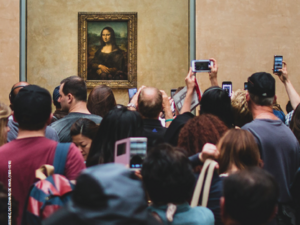Digital tourism: an opportunity for local authorities
The tourist industry has been as much disrupted by digital technology as any other. A digital capability makes for better knowledge of visitors. It makes it possible to go and look for them in their places of origin, to support them during their stays and keep their loyalty on their return home. Tourist destinations face growing international competition at a time of rising demand for personalised travel offerings. As the stakes are very high for local territorial authorities, they should consider digital technology as part and parcel of their tourist attraction strategy.
The Internet has enabled travellers to be less reliant on travel agencies and classic guide-books when planning their holidays.
Travel experience transformed by digital technology
Photos, videos and travel blogs shared on social networks give people ideas about where to go. When comparing potential destinations, aspiring travellers consult not only official websites and websites of tour operators, but platforms such as TripAdvisor that combine travel evaluation with travel booking. In this process, peer-to-peer ratings influence choice in addition to the available budget and time constraints. Once decisions are made, the aspiring travelers go online to pay for their plane or train tickets, accommodation bookings and activities (good plans), and so on. On arrival, particularly if travelling from afar, travellers are almost obsessive about their free Wi-Fi to be able to access online services. Wi-Fi is increasingly available in airports and stations but is still lacking in public spaces. Connected travellers (via Google Maps) can find their way around independently and add new activities to their travel programme, thanks to location-linked recommendations or to local exchanges in situ. Travel experiences can then be shared through social networks, vlogs and/or blogs accompanied by hashtags. Once back home, it is now the travellers’ turn to become recommenders, giving their opinions to others based on their own experience, thereby motivating or dissuading other potential visitors. Using digital technologies enables travellers to become their own tour operators. And their choices can be influenced by strong promotional pressure. Highly contextualised and individually tailored proposals made to appear as rare or unusual opportunities are their main added value.
Digitally supported tourism: an opportunity to be taken by local authorities and their stakeholders
Local government authorities and their agencies are responsible for the image and aura generated by their territorial entities. Investments are made to induce a desire to find out more about a destination by identifying it, explaining it and “selling” it wrapped in an attractive narrative conveyed in promotional films (via YouTube), websites, mobile applications and even tutorials. Many destinations have enhanced their attractiveness in this way, including London (visitlondon.com), Dubai (visitdubai.com), Berlin (visitberlin.de) and New York (newyorkcity.fr targeting visitors from France). These destinations all compete with the so-called “Ile-de-France” Region, which is promoted internationally and branded as the Paris Region. Instagram, YouTube, Expedia, Airbnb, etc., are “must-use” communication channels in direct contact with travellers. Websites selling tickets and other services can collect data to identify visitors, better understand their needs and wants and personalise their offerings by suggesting sites, places and activities either pre-journey or in real time while travelling. The emergence of such platforms is a response to demand for forward planning, choice of accommodation, means of mobility and access to extended ranges of activities and services, from concierge services to left-luggage, etc.
Digital tools help local authorities to capitalise on the “after travel” experience
Digital platforms have also favoured the emergence of “experiential” tourism, which seeks authenticity and a better match to traveler aspirations. Innovations have re-invented the visiting experience thanks to guided tours, augmented reality, 3D, cultural mediation through “chatbots”, automated real time translation, etc. Digital tools help local authorities to capitalise on the “after travel” experience. Visitors who have enjoyed their stay become ambassadors and potential candidates for repeat visits. Links with visitors must be kept alive thanks to personalised and gratifying offers that induce them to return to discover places they have yet to explore and are well suited to their tastes.
Need for an ambitious digital strategy
Today, digital technologies are a vital component of local authority tourist attraction strategies, ensuring that visitors’ expectations are met and enhancing the perceived value of local areas and the availability of quality offerings. A local authority digital tourist strategy needs to do the following:
- provide suitable amenities including free Wi-Fi in public places, high quality urban spaces and the protection and highlighting of heritage sites, etc.;
- improve the digital experience of on-line visitors by introducing proactive promotional approaches, adopting protocols of interactivity that meet international standards, and which are responsive, user-friendly and allow easy access to content in suitable formats, etc.;
- manage the skills available internally to ensure the ability to put digital technologies to good use, develop and maintain tools for promoting offerings that suit the targeted customers, gather and analyse data collected from visitors in order to build increasingly attractive and customised offers, while managing the e-reputation of the territories concerned, etc.;
- adopt a policy of support for innovation in the tourist sector based on a strategic vision of changes in the demand for the territory concerned in order to position itself as of now for the tourism of tomorrow.
Marion Tillet, geographer-urban planner and Sylvain Beaubois, sociologist-urban planner, L'Institut Paris Region
This page is linked to the following category :
Economy
